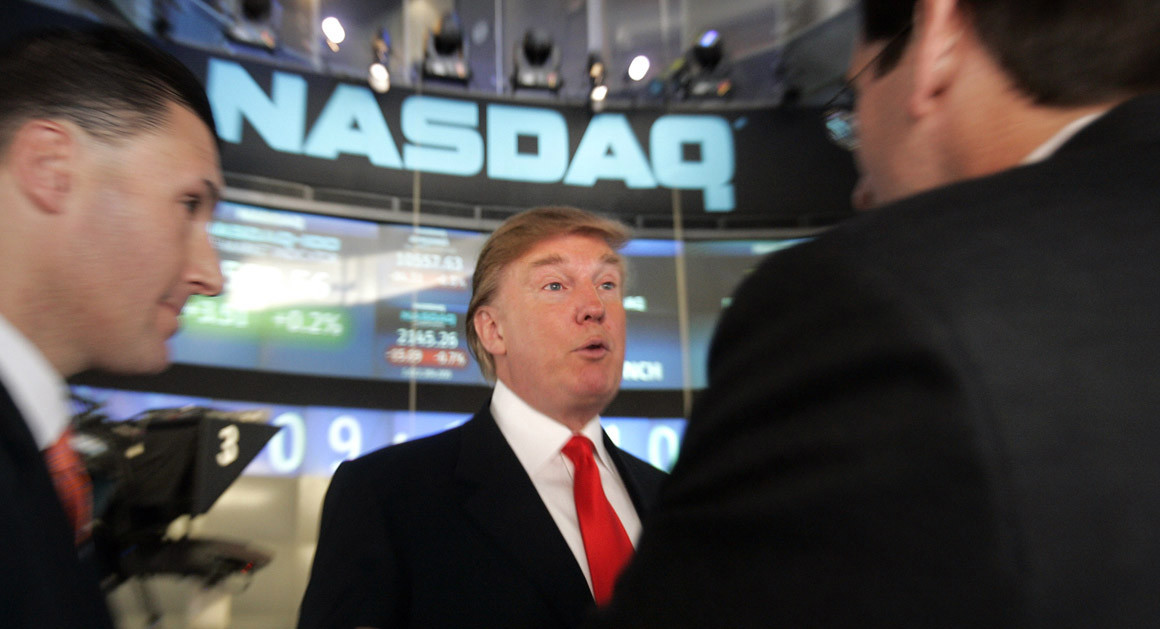Economy
Veterans Day Holiday May Lead to Choppy Trading on Wall Street

By Investors Hub
The major U.S. index futures are pointing to a lower open on Monday, with stocks likely to see further downside after moving notably lower last Friday.
Lingering concerns about the outlook for global economic growth and a continued increase in interest rates may contribute to early weakness on Wall Street.
Government officers, the bond markets, and most banks are closed in observance of Veterans Day, however, potentially leading to limited trading activity.
A lack of major U.S. economic data may also keep some traders on the sidelines, contributing to a relatively choppy trading day.
In the coming days, traders are likely to keep a close eye on reports on consumer price inflation, retail sales, and industrial production.
A speech by Federal Reserve Chairman Jerome Powell on Wednesday is also likely to attract attention, as traders look for additional clues about the outlook for interest rates.
Last week, the Fed left interest rates unchanged as widely expected but indicated it remains on track to gradually raise rates despite signs of a slowdown in the pace of growth in business investment.
CME Group’s FedWatch tool currently indicates a nearly 76 percent chance the Fed will raise rates by a quarter point following a two-day meeting scheduled for December 18th and 19th.
Following the mixed performance seen on Thursday, stocks moved mostly lower during the trading day on Friday. With the drop on the day, the Dow pulled back off its best closing level in a month.
The major averages climbed well off their worst levels of the day but remained firmly in negative territory. The Dow fell 201.92 points or 0.8 percent to 25,989.30, the Nasdaq tumbled 123.98 points or 1.7 percent to 7,406.90 and the S&P 500 slid 25.82 points or 0.9 percent to 2,781.01.
Despite the pullback on the day, the major averages all moved higher for the week. The Dow surged up by 2.8 percent, the S&P 500 jumped by 2.1 percent and the Nasdaq climbed by 0.7 percent.
The weakness on Wall Street partly reflected renewed concerns about the outlook for interest rates on the heels of the Federal Reserve’s monetary policy announcement on Thursday.
The Fed left interest rates unchanged as widely expected but indicated it remains on track to gradually raise rates despite signs of a slowdown in the pace of growth in business investment.
Adding to the concerns about interest rates, the Labor Department released a report showing a much bigger than expected increase in producer prices in the month of October.
The Labor Department said its producer price index for final demand climbed by 0.6 percent in October after rising by 0.2 percent in September. Economists had been expecting another 0.2 percent uptick.
Excluding food and energy prices, core producer prices still rose by 0.5 percent in October after edging up by 0.2 percent in September. Core prices had been expected to rise by another 0.2 percent.
Compared to the same month a year ago, producer prices in October were up by 2.9 percent, reflecting an acceleration from the 2.6 percent increase in September.
The annual rate of growth in core consumer prices also accelerated modestly to 2.6 percent in October from 2.5 percent in September.
“Overall, the producer prices data show that inflationary pressures remain fairly strong, which will keep the Fed hiking rates once a quarter in the near term,” said Andrew Hunter, U.S. Economist at Capital Economics.
A separate report from the University of Michigan showed a slight deterioration in consumer sentiment in the month of November.
The report said the consumer sentiment index edged down to 98.3 in November from the final October reading of 98.6. Economists had expected the index to dip to 98.0.
Extending a recent sell-off, tobacco stocks moved sharply lower over the course of the session, dragging the NYSE Arca Tobacco Index down by 3.5 percent. The index tumbled to its lowest closing level in well over two months.
The steep drop by tobacco stocks was partly due to a report from the Wall Street Journal indicating FDA Commissioner Scott Gottlieb plans to pursue a ban on menthol cigarettes.
Substantial weakness was also visible among biotechnology stocks, as reflected by the 2.8 percent slump by the NYSE Arca Biotechnology Index.
Steel stocks also saw considerable weakness amid concerns about the outlook for global demand, with the NYSE Arca Steel Index plunging by 2.5 percent.
Technology, gold, retail and brokerage stocks also showed notable moves to the downside, reflecting broad based weakness on Wall Street.
Economy
Flour Mills Supports 2026 Paris International Agricultural Show

By Modupe Gbadeyanka
For the second time, Flour Mills of Nigeria Plc is sponsoring the Paris International Agricultural Show (PIAS) as part of its strategies to fortify its ties with France.
The 2026 PIAS kicked off on February 21 and will end on March 1, with about 607,503 visitors, nearly 4,000 animals, and over 1,000 exhibitors in attendance last year, and this year’s programme has already shown signs of being bigger and better.
The theme for this year’s event is Generations Solution. It is to foster knowledge transfer from younger generations and structure processes through which knowledge can be harnessed to drive technological advancement within the global agricultural sector.
In his address on the inaugural day of the Nigerian Pavilion on February 23, the Managing Director for FMN Agro and Director of Strategic Engagement/Stakeholder Relations, Mr Sadiq Usman, said, “At FMN, our mission is Feeding and Enriching Lives Every Day.
“This is a mandate we have fulfilled through decades of economic shifts, rooted in a culture of deep resilience and constant innovation. We support this pavilion because FMN recognises that the next frontier of global Agribusiness lies in high-level technical exchange.
“We thank the France-Nigeria Business Council (FNBC), the organisers of the PIAS, and our fellow members of the Nigerian Pavilion – Dangote, BUA, Zenith, Access, and our partners at Creativo El Matador and Soilless Farm Lab— we are exceedingly pleased to work to showcase the true face of Nigerian commerce.”
Speaking on the invaluable nature of the relationship between Nigeria and France, and the FMN’s commitment to process and product innovation, Mr John G. Coumantaros, stated, “The France – Nigeria relationship is a valuable partnership built on a shared value agenda that fosters remarkable Intercontinental trade growth.
“Also, as an organisation with over six decades of transformational footprint in Nigeria and progressively across the African Continent, FMN has been unwaveringly committed to product and process innovation.
“Therefore, our continuous partnership with France for the success of the Paris International Agricultural Show further buttresses the thriving relationship between both countries.”
PIAS is one of the most widely attended agricultural shows, with thousands of people from across the world in attendance.
Economy
NEITI Backs Tinubu’s Executive Order 9 on Oil Revenue Remittances

By Adedapo Adesanya
Despite reservations from some quarters, the Nigeria Extractive Industries Transparency Initiative (NEITI) has praised President Bola Tinubu’s Executive Order 9, which mandates direct remittances of all government revenues from tax oil, profit oil, profit gas, and royalty oil under Production Sharing Contracts, profit sharing, and risk service contracts straight to the Federation Account.
Issued on February 13, 2026, the order aims to safeguard oil and gas revenues, curb wasteful spending, and eliminate leakages by requiring operators to pay all entitlements directly into the federation account.
NEITI executive secretary, Musa Sarkin Adar, called it “a bold step in ongoing fiscal reforms to improve financial transparency, strengthen accountability, and mobilise resources for citizens’ development,” noting that the directive aligns with Section 162 of Nigeria’s Constitution.
He noted that for 20 years, NEITI has pushed for all government revenues to flow into the Federation Account transparently, calling the move a win.
For instance, in its 2017 report titled Unremitted Funds, Economic Recovery and Oil Sector Reform, NEITI revealed that over $20 billion in due remittances had not reached the government, fueling fiscal woes and prompting high-level reforms.
Mr Adar described the order as a key milestone in Nigeria’s EITI implementation and urged amendments to align it with these reforms.
He affirmed NEITI’s role in the Petroleum Industry Act (PIA) and pledged close collaboration with stakeholders, anti-corruption bodies, and partners to sustain transparent management of Nigeria’s mineral resources.
Meanwhile, others like the Petroleum and Natural Gas Senior Staff Association of Nigeria (PENGASSAN) have kicked against the order, saying it poses a serious threat to the stability of the oil and gas industry, calling it a “direct attack” on the PIA.
Speaking at the union’s National Executive Council (NEC) meeting in Abuja on Tuesday, PENGASSAN President, Mr Festus Osifo, said provisions of the order, particularly the directive to remit 30 per cent of profit oil from Production Sharing Contracts (PSCs) directly to the Federation Account, could destabilise operations at the Nigerian National Petroleum Company (NNPC) Limited.
Mr Osifo firmly dispelled rumours of imminent protests by the union, despite widespread claims that the controversial executive order threatens the livelihoods of 10,000 senior staff workers at NNPC.
He noted, however, that the union had begun engagements with government officials, including the Presidential Implementation Committee, and expressed optimism that common ground would be reached.
Mr Osifo, who also serves as President of the Trade Union Congress (TUC), expressed concerns that diverting the 30 per cent profit oil allocation to the Federation Account Allocation Committee (FAAC), without clearly defining how the statutory management fee would be refunded to NNPC, could affect the salaries of hundreds of PENGASSAN members.
Economy
Dangote Cement Deepens Dominance, Export Activities With $1bn Sinoma Deal

By Aduragbemi Omiyale
To strengthen its domestic market dominance, drive its export activities, optimise existing operational assets and enhance production efficiency and capacity expansion, Dangote Cement Plc has sealed $1 billion strategic agreements with Sinoma International Engineering for cement projects across Africa.
The president of Dangote Industries Limited, the parent firm of Dangote Cement, Mr Aliko Dangote, disclosed that the deal reinforces the company’s long-term growth strategy and aligns with the broader aspirations of the Dangote Group’s Vision 2030.
According to him, Sinoma will construct 12 new projects and expand others for the cement organisation across Africa, helping to achieve 80 million tonnes per annum (MTPA) production capacity by 2030, while supporting the group’s overarching target of generating $100 billion in revenue within the same period.
Under the Strategic Framework Agreement, Sinoma will collaborate with Dangote Cement on the delivery of new plants, brownfield expansions, and modernisation initiatives aimed at strengthening operational performance across key markets.
The new projects include a new integrated line in Northern Nigeria with a satellite grinding unit, a new line in Ethiopia and other projects in Zambia/Zimbabwe, Tanzania, Sierra Leone and Cameroon. In Nigeria, Sinoma will also handle different projects in Itori, Apapa, Lekki, Port Harcourt and Onne.
The projects signal Dangote Cement’s sustained commitment to consolidating its leadership position within the African cement industry, while enhancing its competitiveness on the global stage.
Chairman of the Dangote Cement board, Mr Emmanuel Ikazoboh, during the agreement signing event in Lagos, explained that the new projects would enable the company to play a critical role in actualising Dangote Group’s Vision 2030.
The new projects, when completed, will increase Dangote Cement’s capacity and dominant position in Africa’s cement industry.
On his part, the Managing Director of Dangote Cement, Mr Arvind Pathak, said the agreement reflects the company’s determination to grow its investments across African markets to close supply gaps and support the continent’s infrastructural ambitions.
According to him, Dangote Cement is committed to making Africa fully self‑sufficient in cement production, creating more value and linkages, leading to increased economic activities and a reduction in unemployment.
-

 Feature/OPED6 years ago
Feature/OPED6 years agoDavos was Different this year
-
Travel/Tourism10 years ago
Lagos Seals Western Lodge Hotel In Ikorodu
-

 Showbiz3 years ago
Showbiz3 years agoEstranged Lover Releases Videos of Empress Njamah Bathing
-

 Banking8 years ago
Banking8 years agoSort Codes of GTBank Branches in Nigeria
-

 Economy3 years ago
Economy3 years agoSubsidy Removal: CNG at N130 Per Litre Cheaper Than Petrol—IPMAN
-

 Banking3 years ago
Banking3 years agoSort Codes of UBA Branches in Nigeria
-

 Banking3 years ago
Banking3 years agoFirst Bank Announces Planned Downtime
-

 Sports3 years ago
Sports3 years agoHighest Paid Nigerian Footballer – How Much Do Nigerian Footballers Earn




















